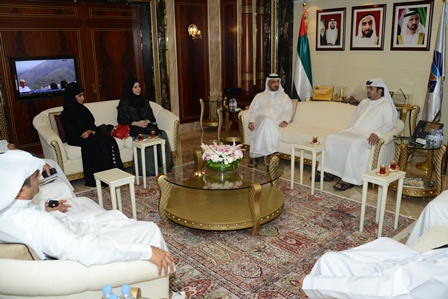His Excellency Ahmed Butti Ahmed, Executive Chairman of Ports, Customs and Free Zone Corporation and Director General of Dubai Customs, received a leadership delegation from the General Authority of Ports, Borders and Free Zones Security, headed by the Director General of the Authority His Excellency Jassim Al Za’abi.
Mr. Butti welcomed the high profile delegation, and expressed his hope that this mutual cooperation would serve the interests of both sides’ business systems and programs, so as to strengthen the already existing work relations and the exchange of practical experiences between both parties.
A joint meeting was held between Dubai Customs and the Authority, where the delegation was briefed on the advanced technologies deployed by Dubai Customs. The most notable of these advanced technologies is the Mirsal-2 System and its auxiliary systems, particularly the Risk Engine and customs clearance system. The delegation learned about the vital role these systems play in facilitating business operations while maintaining the safety and security of the community. The Dubai Customs’ Risk Engine project, which nailed the 2012 Dubai Government Excellence Program Award for the Distinguished Technical Project Category, was developed to keep the community protected against banned and counterfeit goods and items, minimize waste of government resources, and enhance risk management practice while ensuring smooth work flow.
Moreover, the system has significantly contributed to solidifying Dubai Customs’ position as a legal trade advocate both regionally and internationally. It has also broadly helped facilitate and expedite procedures and reduce the time needed for transaction processing.

The delegation was introduced to the customs clearance procedures, through which Dubai Customs is committed to facilitation and compliance while performing the customs inspection process for all inbound goods and consignments through all customs ports. They were also detailed on the free zone customs clearance procedures, specifically Dubai Customs’ role in managing all cargo-related operations for goods coming through free zones, and quality services offered to clients and importers. Later, the delegation visited the Customs Headquarters’ Operations Room, where they were briefed on the staff’s working procedures, along with the process of establishing coordination between Dubai Customs-affiliated customs centers spread across the emirate. They were also informed about recent electronic systems and programs utilized in the room, which were upgraded recently to keep pace with technological advancements in customs work.
The delegation’s tour also included a field visit to Dubai Cargo Village, where they received briefings on inspection procedures for imported goods and other related procedures. The delegation witnessed Dubai Customs’ unwavering dedication to securing customer satisfaction - whether at land, air, or marine ports- by providing premium-quality services and facilitating operations, consistent with the Department’s compliance and facilitation policy.
In a similar context, it is important to note that a few weeks ago, Dubai Customs announced the transformation of all its customs services to 100% smart services available via mobile phones. This makes Dubai Customs the first UAE government entity to accomplish such a remarkable achievement. Moreover, the Department had previously received a certificate of recognition from the World Customs Organization through its issued Columbus Report. The report advised all customs authorities around the world to learn and benefit from Dubai Customs’ systems and experiences, as the systems implemented by Dubai Customs are world-class and state-of-the-art. The report declared that Dubai Customs is to be considered a role model in its field of business.
Towards the end of the visit, both parties agreed to arrange regular visits, as these exchanges effectively contribute to the development of work procedures at various ports across the UAE. This will ultimately secure a distinguished position for Dubai Customs in terms of task and work operations implementation.